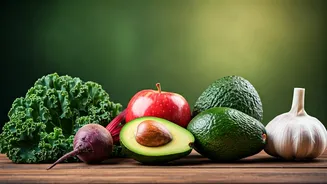Berries: Nature's Antioxidants
Berries, like blueberries, strawberries, and raspberries, are packed with antioxidants. These compounds are crucial in protecting the liver from damage
caused by free radicals. Free radicals are unstable molecules that can harm cells, leading to inflammation and disease. The antioxidants in berries neutralize these free radicals, thereby reducing oxidative stress on the liver. Additionally, berries contain vitamins and minerals that contribute to overall liver health. Regular consumption of berries can support liver function, which is responsible for detoxifying the body. The antioxidants in berries have anti-inflammatory properties that can further assist the liver in its detoxification process. Including a handful of berries in your daily diet is an easy and delicious way to promote a healthier liver and improve overall well-being. Consider adding them to your breakfast, snacks, or salads to maximize their benefits.
Leafy Greens: Nutritional Powerhouses
Leafy green vegetables such as spinach, kale, and lettuce are loaded with essential nutrients. These nutrients are important for the liver's function. They are rich in antioxidants and also contain fiber, which helps in the digestive process. A healthy digestive system is essential for liver health as it reduces the workload on the liver by ensuring proper waste elimination. Leafy greens also contain compounds that can neutralize heavy metals and other toxins that could harm the liver. These vegetables are also a source of chlorophyll, which has detoxifying properties. Regular consumption of leafy greens can reduce inflammation and support the liver's ability to clear toxins from the body. You can easily incorporate these vegetables into your diet by adding them to smoothies, salads, or side dishes. The variety of leafy greens available allows for diverse culinary experiences while contributing to liver health. Consider adding a mix of spinach, kale, and lettuce to benefit from a wide range of vitamins and minerals for optimal liver function.
Beans & Legumes: Fiber Boosters
Beans and legumes, including lentils, chickpeas, and various types of beans, are excellent sources of fiber. Fiber is vital for maintaining a healthy digestive system. A well-functioning digestive system is essential for reducing the burden on the liver. By promoting regular bowel movements, fiber helps in eliminating waste and toxins from the body, preventing them from being reabsorbed into the bloodstream. This reduces the strain on the liver, allowing it to function more efficiently. Legumes are also a good source of protein, which is essential for repairing and maintaining liver cells. They are rich in various nutrients and antioxidants that contribute to overall liver health. Regular consumption of beans and legumes can help to support liver function and protect against liver disease. You can include beans and legumes in soups, stews, salads, or as side dishes. Their versatility makes them a simple addition to a balanced diet for a healthier liver.
Carrots: Beta-Carotene Benefits
Carrots are rich in beta-carotene, a type of carotenoid that the body converts into vitamin A. Vitamin A is crucial for several bodily functions, including maintaining liver health. It acts as an antioxidant, protecting the liver from damage caused by free radicals. Carrots also contain other vitamins and minerals that support liver function. They can help reduce inflammation and assist in the detoxification process. Incorporating carrots into your diet can help promote a healthier liver and prevent potential liver issues. The high fiber content in carrots also aids in the digestive process, reducing the workload on the liver. Carrots can be consumed raw, cooked, or juiced. Adding them to salads, soups, or as a snack can be an easy way to ensure that your liver gets the necessary support for optimal function. Consider eating carrots alongside a source of healthy fats to increase absorption of the fat-soluble vitamin A.
Broccoli & Cruciferous Veggies
Broccoli, cauliflower, Brussels sprouts, and other cruciferous vegetables are known for their beneficial effects on liver health. These vegetables contain compounds that can boost the liver's natural detoxification processes. They are rich in fiber, which supports healthy digestion and reduces the burden on the liver. Cruciferous vegetables also contain antioxidants that protect the liver from damage caused by harmful substances. These compounds can help the liver break down toxins and eliminate them from the body. Regular consumption of these vegetables can contribute to a healthier liver and reduce the risk of liver-related diseases. Consider incorporating broccoli, cauliflower, or Brussels sprouts into your diet by steaming, roasting, or adding them to salads and stir-fries. Eating these vegetables regularly can provide your liver with crucial support for optimal functioning. The nutrients present in these vegetables contribute to a strong liver, and the diverse cooking options make it easy to incorporate them into your meals.




















